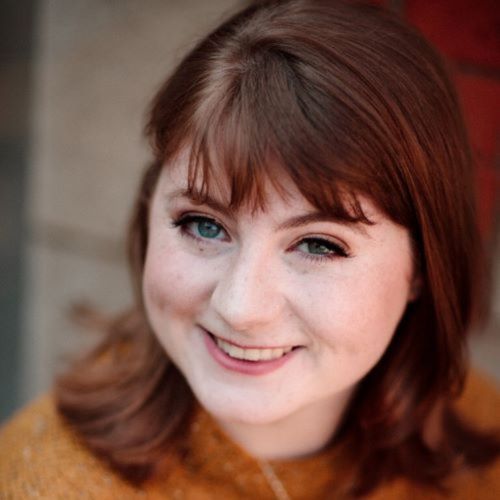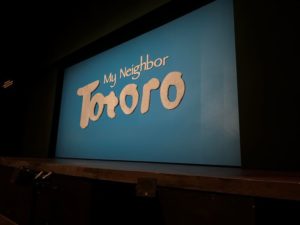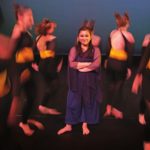
Theatre student examines and executes stage adaptation

Theatre major Audrey Klosterman ’23 went to London in July 2022 as part of a TREK program. After one of the 15 shows she watched, she noticed something unusual in the Royal Shakespeare Company (RSC) gift shop. They sold merchandise featuring Totoro, a 1988 animated film character. But this character wasn’t animated—he was from the adapted stage play that she later realized was rehearsing at RSC.
Klosterman was intrigued by the adaptation discovery and says that invaluable trip led her to pursue a senior Independent Study project analyzing written works and movies that were adapted into stage productions. “I kept coming back to this idea of how people bring movies, novels, and comics to stage,” recalled Klosterman. “I love stories and wanted to look into how they change from one format to another.”
“I’m not saying it’s better to not engage with the original source, but people might not have heard about a story if not for a theatrical production or a movie, so adaptations bring the story to a larger audience.” —Audrey Klosterman ’23, I.S. title: My Favorite Movie is a Play! An Analysis of Adaptations to Stage and Film
She researched a total of six productions, including two from written works, two successful adaptations from movies, and two major flops adapted from well-known titles in movies and print. “It’s very different to adapt from a visual source rather than just words on a page, so I wanted to make sure I studied a variety of types of shows as well,” said Klosterman, whose I.S. mentor was Naoko Skala, assistant professor of theatre & dance and women’s, gender, & sexuality studies.
Thanks to Copeland Funding, she returned to London in January 2023 to see My Neighbour Totoro, Hex (based on the story of Sleeping Beauty), and Back to the Future The Musical (based on the popular 1985 film). “Traveling to see those shows in person meant I could form my own opinions rather than having to rely on critics that might have clouded my judgment,” said Klosterman, who captured her thoughts throughout the shows and at the interval, which she discovered is the U.K.’s version of an intermission.
She was also elated to interview (via Zoom) Tom Morton-Smith who penned the Totoro adaptation. “It was interesting learning about his process—not only with his writing, but also with the actual creation of the set, props, and casting,” said Klosterman. “He talked a lot about how they worked to actually translate it to stage, and about working with the Jim Henson’s Creature Shop to create Totoro, a forest spirit, and kind of a big and fluffy raccoon/rabbit/bear sort of thing.” 
Klosterman also dove into some of the downfalls of unsuccessful movie adaptations. Carrie The Musical, a 1988 production that was revived in 2012, was the shortest-lived show on Broadway having been open for just three days. Spider-Man: Turn Off the Dark was plagued by a delayed opening with underfunded effects and endless technical difficulties. “It’s wild to think it actually ran for as long as it did from June 2011 to January 2014,” said Klosterman.
In addition to researching adaptations, Klosterman took a 10-minute play from a fellow Wooster grad called This Time and adapted it into her own short film. She cast actors, rehearsed, and filmed on a Saturday in October at a local park. She aslo showed the film at the annual Senior Research Symposium in April.
The main question Klosterman wanted to answer was ‘why do we continue to make adaptations?’ She concluded that every adaptation sets out to reach the same goal: to share a story with an audience that might have been ignored or otherwise missed in its original form. War and Peace is well over 1,000 pages so very few people are going to read that book, but Natasha, Pierre & the Great Comet of 1812 is based on a sliver of that. “It’s a 2.5-hour musical that’s digestible, interesting, and visual,” argued Klosterman. “A lot of people will see the Great Comet and will get that story without having to read it. I’m not saying it’s better to not engage with the original source, but people might not have heard about a story if not for a theatrical production or a movie, so adaptations bring the story to a larger audience.”
In similar fashion, Klosterman said Wooster’s theatre department gave students the ability to explore many areas of the stage. “I’ve acted, stage managed, worked in the box office, ushered, and kind of done it all,” boasted Klosterman. “Wooster really allows for you to not get stuck in one area, and I wanted that flexibility, so I wasn’t tied down to one skill.” After working as house manager at the Ohio Light Opera on Wooster’s campus this summer, Klosterman hopes to pursue theatre management opportunities on the East coast and elsewhere. She’s still flexible.
Image 1: Audrey Klosterman ’23. Photo by Robb McCormick Photography
Image 2: The stage of the My Neighbor Totoro stage adaptation. Photo by Audrey Klosterman
Posted in Independent Study on June 1, 2023.
Related Posts
Related Areas of Study
Theatre & Dance
Scholarship and artistry in theatre and dance for those who are passionate about performance in all its forms.
Major Minor

